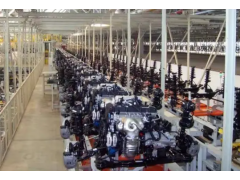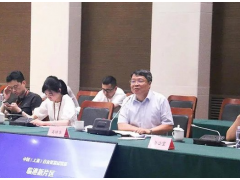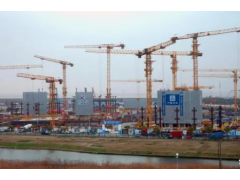Reporter Wu Danlu Shu Han Ju Hefei
35 tertiary hospitals receive 94 million visits from all over the country every year. How does Shanghai do it? Digital transformation is the source of confidence.
In recent years, more and more digital services are happening in Shanghai's transportation, medical care, elderly care, commerce and other fields. To explore the reasons for this is inseparable from Shanghai's urban digital transformation.
At present, Shanghai has taken the promotion of urban digital transformation as one of the main directions of economic and social development during the "14th Five-Year Plan" period, and coordinated the promotion of comprehensive digital transformation in various fields of "economy, life, and governance". An international digital capital with world influence.
Digitalisation of the economy: robot density is more than twice the international average
On April 7, the Shanghai Urban Digital Transformation Experience Hall was officially opened at No. 465, Jingxing Road, Yangpu District. The largest exhibition area of the entire exhibition hall was given to the economic digital exhibition area. Economic digitalization can be understood from two levels: digital economy and industrial digital transformation.
Some obvious signs of the development of Shanghai’s digital industry are that Shanghai’s third-party payment companies account for 60% of the national market share, local life service companies account for 70% of the national market share, online literature companies account for 90% of the national market share, and online game companies account for 60% of the national market share. Accounting for 30% of the national market share, a number of star enterprises such as Bilibili, Pinduoduo, China Literature, and Mihayou were born in Shanghai.
In 2021, the added value of the core industries of Shanghai's digital economy will reach 536.727 billion yuan, accounting for 12.4% of GDP, and it is in a leading position in the Yangtze River Delta. In 2021, the growth rate of the added value of the core industries of Shanghai's digital economy will reach 15.5%. According to the plan of this year's Shanghai government work report, in the next five years, the added value of core industries in Shanghai's digital economy will account for 18% of GDP.
Shanghai has a strong industrial foundation. Under the empowerment of digitalization, the energy level of Shanghai's aviation, aerospace, shipbuilding, automobile and other industries has been continuously improved, and more parks focusing on industrial digitalization have emerged as the times require.
Fourier Intelligence, which independently develops rehabilitation robots, is a typical case. In 2015, Fourier Intelligence was born in Zhangjiang. In 2020, after the establishment of Zhangjiang Robot Valley, it successfully settled in. Industrial agglomeration brings a very good industrial chain advantage. The laboratory's research results are optimized through the upstream supply chain to reduce costs and increase efficiency, and find application scenarios in downstream hospitals at all levels to promote commercial application of products. "In Zhangjiang Robot Valley, we have obtained a very good brand effect, international resources, upstream and downstream industry chain resources, and even a high-quality talent team, which has brought the development of start-up companies to a higher level." said Gao Chongli, Product Manager of Fourier Intelligence.
Tang Wenkan, deputy director of the Municipal Economic and Information Commission, introduced that in recent years, Shanghai has focused on promoting the coordinated development of digital transformation and green transformation of the manufacturing industry. A total of 100 smart factories have been built, and 8 national-level smart manufacturing demonstration factories have been built. A benchmark manufacturing company; the density of robots in Shanghai is 260 units per 10,000 people, more than twice the international average level; 26 influential industrial Internet platforms have been formed, linking more than 1.2 million enterprises and 8.22 million devices across the country, and promoting a batch of "5G +AI+Industrial Internet" innovative application.
In terms of the digital transformation of the manufacturing industry, Shanghai’s goal is that by 2025, the digital diagnosis of manufacturing enterprises above designated size will be fully covered, and the proportion of digital transformation will not be less than 80%.
Digitization of life: No. 1 in the country in terms of service index
Economic digitization takes place more behind industries, and digital life is closely related to every citizen.
Seeing a doctor, traveling, going to school, traveling, sports, elderly care, etc. are the scenes where citizens' high-frequency urgent problems are concentrated. In response to these scenarios, Shanghai actively guides the participation of market players, bringing together more than 100 units and enterprises to promote the digital transformation of key scenarios.
For example, in order to facilitate citizens to seek medical treatment, based on the Health Network Project and the Medical Alliance Project, Shanghai took the lead in realizing the unification of the number source pool of municipal hospitals, and the "one network" of medical examination records across hospitals in the city. Through in-depth learning of medical history big data, 255 pre-inquiry knowledge templates for clinical specialties have been established, which are open and shared to all hospitals in the city. At present, the appointment time of all municipal hospitals has been shortened to within 30 minutes, and more than 20 hospitals are accurate to 15 minutes, alleviating the phenomenon of "difficult registration, slow payment, and long queues".
In terms of travel, under the guidance of the Shanghai Municipal Transportation Commission, the MaaS (Mobility as a Service) construction entity was established along with Shenxing Company. The MaaS platform will gradually gather all kinds of traffic and travel information. At present, it has realized the full coverage of the city's public transportation "three-code integration", built a parking reservation entrance in Shanghai, and 100% of the city's toll road parking lots can be paid online. Top three hospitals, key business districts 100% of the transportation hubs can reserve parking.
In terms of digital education development, Shanghai successfully applied for the only pilot area for digital transformation of education in the country, initially built an educational digital base, and supported 85 schools to carry out personalized teaching model reforms in the form of "standardized platform + personalized plug-in"; perfected the educational resource platform And subject knowledge map, the platform gathers 37,000 educational resources in 545 categories to promote the equalization of educational resources in the city.
In terms of digitization of cultural tourism, with governance data supporting convenient life services, more than 3,000 hotels in the city have achieved 30-second scan code check-in.
A good transformation is one that can solve the urgent, difficult, and anxious problems of the citizens. The research shows that Shanghai has entered the top ten in the country in multiple indicators such as digital administrative services, public services, and digital life services, and the digital life service index ranks first in the country.
Governance Digitization: "I Didn't Expect to Do Things Like This"
If the digitalization of the economy and life is the goal, then the governance of digital transformation is the fundamental guarantee for the above two.
In recent years, enterprises have felt the deepest changes brought about by the digitization of governance in Shanghai. City-level, district-level, and sub-district government service points are driven by technology, using intelligent means such as big data and AI, and strive to create "online shopping" services for office personnel and service enterprises, promote the transformation of passive services to active services, and improve the speed of handling and quality.
Take the window smart office reform in Pudong New Area as an example. In the past, domestic-funded enterprises needed to fill in 3 documents with 51 elements to change their business scope. Many enterprises were not clear about the government’s review rules, and they were prone to repeated revisions due to incorrect filling or irregular materials. run back and forth. After using the window "smart assistant", the enterprise only needs to inform one element of the changed "business scope", and all other elements are completed by the window staff. Many business personnel said that they "didn't expect to be able to do things like this", and the previous cumbersome procedures were completed in one go.
For the citizens of Shanghai, the "One Net Service" has been integrated into daily life, going out to do errands, seeking medical treatment and employment.
Up to now, Shanghai has opened 220 neighborhood and town community affairs acceptance centers, providing 11 municipal departments with over 190 high-frequency matters to handle, creating a 15-minute government service circle. In 2022, the volume of handling cases will exceed 12 million, among which, more than 2.4 million people will be handled near the place of residence registration. In addition, in order to meet the needs of office workers to handle affairs on rest days, Shanghai has also expanded the service channels of self-service terminals. Various self-service terminals have launched 427 items and 654 types of certificate printing services, providing services for more than 7.37 million times in total, achieving "personal matters" The whole city is open, one window is accepted, and it is open all year round."
At the press conference on Shanghai's high-quality development held yesterday, Shao Jun, director of the Shanghai Big Data Center, introduced that in the next step, the Shanghai Big Data Center will create a version 2.0 of "All-in-One Handling" to implement smart declaration, smart approval, Innovative service content such as "free application and instant enjoyment", intelligent customer service, and remote virtual windows provide diversified, personalized, caring and high-quality services for market players and the public.




